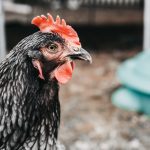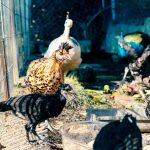As winter approaches, it is essential to prepare chicken coops for colder weather. Proper insulation is a key factor in maintaining a comfortable environment for chickens. This can be achieved by adding extra bedding materials such as straw or wood shavings to the coop floor.
Insulating the walls with foam boards or hanging heavy curtains can further protect against drafts. It is crucial to inspect the coop for any gaps or leaks and seal them to prevent cold air infiltration. While insulation is important, adequate ventilation remains critical for maintaining good air quality and preventing moisture accumulation in the coop.
Installing adjustable vents or windows allows for proper air circulation. Regular cleaning of the coop is necessary to remove droppings and soiled bedding, which can contribute to increased moisture and ammonia levels. Additionally, it is advisable to assess the structural integrity of the coop to ensure it can withstand potential snow loads and strong winds during the winter months.
Table of Contents
- 1 Providing Adequate Shelter and Protection
- 2 Adjusting Feeding and Watering Practices
- 3 Maintaining Proper Ventilation
- 4 Preventing Frostbite and Cold-Related Health Issues
- 5 Keeping the Flock Active and Entertained
- 6 Monitoring Egg Production and Overall Health
- 7 FAQs
- 7.1 What are the key considerations for keeping chickens during the winter?
- 7.2 How can I keep my chicken coop warm during the winter?
- 7.3 What should I feed my chickens during the winter?
- 7.4 How can I prevent my chickens’ water from freezing during the winter?
- 7.5 Are there any special health considerations for chickens during the winter?
Key Takeaways
- Clean and insulate the coop to prepare for winter
- Provide adequate shelter and protection from harsh weather conditions
- Adjust feeding and watering practices to meet the increased energy needs of the flock
- Maintain proper ventilation to prevent moisture buildup and respiratory issues
- Take measures to prevent frostbite and other cold-related health issues in the flock
- Keep the flock active and entertained to prevent boredom and stress
- Monitor egg production and overall health of the flock regularly
Providing Adequate Shelter and Protection
Providing Shelter and Protection
In addition to preparing the coop itself, it’s essential to provide adequate shelter and protection for your chickens during the winter months. This can be achieved by providing a covered outdoor run where the chickens can still get some fresh air and exercise without being exposed to harsh weather conditions. If your chickens free-range, it’s crucial to provide them with access to sheltered areas where they can seek refuge from the cold and wind.
Protecting from Predators
It’s also vital to provide protection from predators during the winter months, as hungry predators may be more desperate for food during this time. Make sure that your coop and outdoor run are secure and that there are no gaps or holes where predators could gain access. Additionally, consider installing motion-activated lights or alarms to deter predators from approaching the coop.
Regular Maintenance and Reinforcement
Finally, it’s a good idea to regularly check for signs of predator activity and reinforce any weak spots in your defenses. This will help ensure that your chickens remain safe and healthy throughout the winter months.
Adjusting Feeding and Watering Practices

During the winter months, it’s important to adjust your feeding and watering practices to ensure that your chickens are getting the nutrition and hydration they need to stay healthy and warm. One way to do this is by providing your chickens with a high-quality layer feed that is specifically formulated for winter conditions. This feed will typically have a higher protein content to help keep your chickens warm and maintain their egg production during the colder months.
In addition to adjusting their feed, it’s important to ensure that your chickens have access to fresh, unfrozen water at all times. This can be achieved by using heated waterers or by regularly checking and replacing frozen water throughout the day. It’s also a good idea to provide warm water in the mornings and evenings to help keep your chickens hydrated and prevent their water from freezing too quickly.
Maintaining Proper Ventilation
Proper ventilation is crucial for maintaining good air quality and preventing moisture buildup in the coop, especially during the winter months when the windows and doors are often closed to keep out the cold. To maintain proper ventilation, consider installing vents or windows that can be opened and closed as needed to allow fresh air to circulate through the coop. It’s also important to regularly clean the coop to remove any droppings or soiled bedding that can contribute to moisture buildup and ammonia levels.
In addition to providing adequate ventilation, it’s important to monitor the humidity levels in the coop. High humidity levels can lead to moisture buildup and create an environment that is conducive to respiratory issues and frostbite. To help maintain proper humidity levels, consider using a dehumidifier or adding absorbent materials such as diatomaceous earth or sand to the coop floor.
Frostbite and other cold-related health issues can be a concern for chickens during the winter months, especially if they are not provided with adequate shelter and protection from the elements. To prevent frostbite, it’s important to regularly check your chickens for any signs of frostbite, such as pale combs and wattles, and take steps to protect them from extreme cold temperatures. One way to prevent frostbite is by applying a thin layer of petroleum jelly or a similar product to your chickens’ combs and wattles, which can help protect them from frostbite.
Additionally, providing your chickens with access to a dry, draft-free coop with plenty of bedding can help keep them warm and prevent frostbite. It’s also important to monitor your chickens for any signs of respiratory issues, such as coughing or wheezing, which can be exacerbated by cold temperatures.
Keeping the Flock Active and Entertained

Preventing Boredom and Encouraging Exercise
During the winter months, it’s essential to keep your flock active and entertained to prevent boredom and encourage exercise. This can be achieved by providing your chickens with enrichment activities such as hanging treats or toys in their coop or outdoor run.
Providing Opportunities for Natural Behaviors
Additionally, consider providing them with access to a dust bath area where they can engage in natural behaviors such as dust bathing, which can help keep them active and entertained.
Exercise and Fresh Air
It’s also important to provide your chickens with opportunities for exercise, even during the winter months when they may be spending more time indoors. This can be achieved by providing them with perches or platforms in their coop where they can roost and stretch their wings. Additionally, consider allowing your chickens access to a covered outdoor run where they can still get some fresh air and exercise without being exposed to harsh weather conditions.
Monitoring Egg Production and Overall Health
Finally, it’s important to monitor your chickens’ egg production and overall health during the winter months. While egg production may naturally decrease during this time due to shorter daylight hours, it’s important to keep an eye on your chickens’ overall health and well-being. This can be achieved by regularly checking for any signs of illness or injury, such as lethargy or abnormal behavior, and taking steps to address any issues that arise.
Additionally, it’s important to monitor your chickens’ egg production and make adjustments to their diet or environment as needed. For example, providing supplemental lighting in the coop can help encourage egg production during the winter months when daylight hours are shorter. It’s also important to ensure that your chickens are getting a balanced diet that meets their nutritional needs during this time, which may require adjusting their feed or providing them with additional supplements.
In conclusion, preparing your chicken coop for winter involves a combination of insulation, ventilation, protection from predators, adjusting feeding and watering practices, preventing cold-related health issues, keeping the flock active and entertained, and monitoring egg production and overall health. By taking these steps, you can help ensure that your chickens stay healthy and comfortable during the winter months.
If you’re looking for tips on how to keep chickens during the winter, you might also be interested in learning about the Producers Pride Sentinel Chicken Coop. This coop is designed to provide a safe and comfortable environment for your chickens, even in the coldest months. Check out this article to learn more about this innovative coop and how it can help you keep your chickens happy and healthy during the winter.
FAQs
What are the key considerations for keeping chickens during the winter?
During the winter, it’s important to ensure that chickens have access to fresh water, a warm and dry coop, and adequate nutrition to help them stay healthy and comfortable.
How can I keep my chicken coop warm during the winter?
To keep the chicken coop warm during the winter, you can insulate the coop, use a heat lamp or heated waterer, and provide plenty of bedding for the chickens to nestle in.
What should I feed my chickens during the winter?
During the winter, it’s important to provide your chickens with a balanced diet that includes plenty of protein and nutrients to help them stay healthy and maintain their body temperature.
How can I prevent my chickens’ water from freezing during the winter?
To prevent your chickens’ water from freezing, you can use a heated waterer, place a heated rock or water bottle in the water, or change the water frequently to prevent it from freezing.
Are there any special health considerations for chickens during the winter?
During the winter, chickens are more susceptible to respiratory issues and frostbite, so it’s important to monitor their health closely and provide them with a warm and dry environment to prevent these issues.
Meet Walter, the feathered-friend fanatic of Florida! Nestled in the sunshine state, Walter struts through life with his feathered companions, clucking his way to happiness. With a coop that’s fancier than a five-star hotel, he’s the Don Juan of the chicken world. When he’s not teaching his hens to do the cha-cha, you’ll find him in a heated debate with his prized rooster, Sir Clucks-a-Lot. Walter’s poultry passion is no yolk; he’s the sunny-side-up guy you never knew you needed in your flock of friends!







